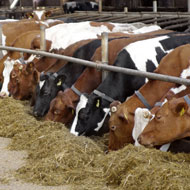More time needed to consider TB testing contracts

One of the biggest concerns raised by practices is the short time frame in which to consider the impact of the new contracts.
Veterinary practices have not been given enough time to consider the impact that new TB testing contracts will have on their businesses, say veterinary associations.
New bovine TB testing contracts were awarded to five delivery partners in February and, earlier this month, those businesses sent contracts to veterinary practices who may be potential sub-contractors.
The deadline for signing these contracts was 24 April and the start date for the contracts is 1 May. This has left practices with just a few days to make decisions that could have a major impact on their businesses, according to the British Veterinary Association (BVA) and British Cattle Veterinary Association (BCVA).
Members of the organisations have raised a number of concerns about the contracts but the short time frame has left only a small window for obtaining the answers to their questions.
In a letter to Defra's secretary of state, Liz Truss, BVA and BCVA called for the deadline to be extended to the end of May, with a start date of 1 June. The associations said they are also in touch with the delivery partners and Animal and Plant Health Agency (APHA) to obtain answers to their members' questions and address specific concerns.
BVA's president John Blackwell said: "The move to tendering for TB testing and other official veterinarian services has caused a significant amount of anxiety for some of our members.
"One of the biggest concerns we are hearing from members is that they have not been given enough time to consider the impact of the new contract on their practice and that they need more time to properly scrutinise the detail and obtain answers to their questions."
BVA opposed the decision to tender for delivery partners to manage and monitor TB testing work. Prior to the new system, testing was done by private vets who were trained, appointed and paid by the APHA.
Mr Blackwell said: "We have consistently warned Defra that the move to tendering must not simply be a cost cutting exercise, because the UK’s network of veterinary practices, which is vital for spotting and dealing with animal disease, is at stake."
It is now essential that the government works alongside the delivery partners and veterinary practices to ensure TB testing can be carried out effectively, he added.



 The Animal and Plant Health Agency (APHA) has updated its online reporting service for dead wild birds.
The Animal and Plant Health Agency (APHA) has updated its online reporting service for dead wild birds.